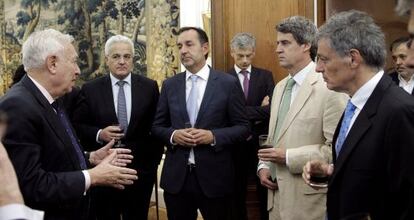Margallo urges Macri to undertake “liberalization without fear”
Foreign minister meets president-elect with relations between countries at rock bottom


Spain is looking to mend its relationship with Argentina as quickly as possible, given that, after 12 years of Kirchnerism, the situation is at rock bottom. As such, Spain’s José Manuel García-Margallo became the first foreign minister to meet with Argentinean President-elect Mauricio Macri on Sunday, exactly a week after the conservative politician defeated Peronist candidate Daniel Scioli in a runoff.
Margallo admitted that it may seem “shocking and contradictory” that no Spanish diplomatic chief has officially visited Argentina since 2007 (Margallo and Prime Minister Mariano Rajoy were in Buenos Aires in 2013 for Madrid’s bid to host the Olympic Games), given that more than 400,000 Spanish citizens live in the South American country, and Spain is its second-largest foreign investor with $13 billion in assets.
As a step to improving the situation, Margallo has extended an official invitation to Macri to visit Spain.
As a step to improving the situation, Margallo has extended an official invitation to Macri to visit Spain
Margallo said Macri’s victory marks a turning point in Spanish-Argentinean relations, which he predicted will be “spectacular” because Cambiemos, Macri’s party, is in tune with Spain’s Popular Party. They share a “very similar” program, he added. And there is a “close” friendship between Rajoy and Macri and between Susana Malcorra, future Argentinean foreign minister and current chief of staff for United Nations Secretary General Ban Ki-moon, and Margallo himself. Macri met with Rajoy on an official visit to Madrid as Buenos Aires mayor and the Spanish prime minister called him to personally congratulate him on his electoral victory.
The Spanish government is not hiding its appreciation for Macri, and the latter is showing equal interest in the relationship. With no parliamentary majority, depleted coffers, scant international credit and powerful Peronist unions ready to ambush him, the president-elect desperately needs an influx of foreign investment.
Margallo put the Spanish government at the newly elected president’s disposition but he warned him that the ball is in his court. He encouraged Macri to undertake “economic liberalization without fear.”
There are more than 250 Spanish companies operating in Argentina and they have high expectations for Macri
After a courtesy visit to the office of Argentinean Foreign Minister Héctor Timerman and a reception with the Spanish community, Margallo and about 20 Spanish business leaders had lunch with two heavyweights on Macri’s economic team, ministers in pectore for treasury and finance, Alfonso Prat Gay, and for growth, Francisco Cabrera.
There are more than 250 Spanish companies operating in Argentina and they have high expectations for Macri, especially after he announced construction plans worth $33 billion. But most of them say words are not enough. The expropriation of YPF included a good compensation deal for Repsol but Spanish investment dropped to nearly zero in the wake of that move.
Besides shifting the direction of the country’s foreign policy, Macri’s victory may have an impact beyond Argentina. Margallo alluded to Venezuela, saying the center-right’s defeat of a populist government “may happen again in the near future” in another country in the region.
Venezuela will hold parliamentary elections on December 6.
English version by Dyane Jean Francois.
Tu suscripción se está usando en otro dispositivo
¿Quieres añadir otro usuario a tu suscripción?
Si continúas leyendo en este dispositivo, no se podrá leer en el otro.
FlechaTu suscripción se está usando en otro dispositivo y solo puedes acceder a EL PAÍS desde un dispositivo a la vez.
Si quieres compartir tu cuenta, cambia tu suscripción a la modalidad Premium, así podrás añadir otro usuario. Cada uno accederá con su propia cuenta de email, lo que os permitirá personalizar vuestra experiencia en EL PAÍS.
¿Tienes una suscripción de empresa? Accede aquí para contratar más cuentas.
En el caso de no saber quién está usando tu cuenta, te recomendamos cambiar tu contraseña aquí.
Si decides continuar compartiendo tu cuenta, este mensaje se mostrará en tu dispositivo y en el de la otra persona que está usando tu cuenta de forma indefinida, afectando a tu experiencia de lectura. Puedes consultar aquí los términos y condiciones de la suscripción digital.








































